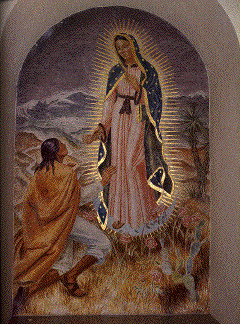INTERESTING TOPICS

"The Virgin of
Gaudalupe"
A fresco done in 1946-47 by Antonio
Garcia,
showing Our Lady appearing
to the Amer-Indian Juan Diego.
.
SOME TOPICS THAT INTEREST ME
- One God in Three Persons.
What does it mean when we say that we believe in a "personal" God
or that we believe in One God "in Three Persons"? For example, is
gender an essential attribute of being a person? Does, therefore,
God have gender? Could God have gender? Or can only human persons,
who have physical bodies, have gender? May any Catholic believe
that each Person of the Trinity has gender (i.e., is either
masculine or feminine)?
- Creation. What really
is the universe that we believe God created out of nothing?
- Sin, Original and Actual. What
are evil and sin? How did they enter the world? In what sense are
all men guilty of sin? How are God's goodness and omnipotence
compatible with man's responsibility for his own salvation or
damnation?
- Temptation. How could the
Devil have ever "tempted" God the Son and why do we pray to God
the Father that He "lead us not unto temptation"?
- Redemption and Salvation. What
does it mean to say someone has been redeemed or has been saved?
- "Extra ecclesiam nullus
omnino salvatur." The Catholic Church has always taught,
and on several occasions even
infallibly defined, the doctrine that "outside the Church no one
at all is saved." This doctrine has a strict, as well as a
moderate and a loose interpretation, depending on the meaning
given the word "extra." All three interpretations are, for
the time being, allowed to Catholics, pending a definitive
resolution of the issue by the Magisterium. Each of these
interpretations, however, would not allow acceptance of either of
the other two. In 1949 the Holy Office of the Inquisition in the
Vatican, in a letter that was approved by Pope Pius XII, rejected
the strict interpretation advanced by Rev. Leonard Feeney, S.J. [a
distant cousin of mine, by the way]. Fr. Feeney was later
dismissed from the Jesuits and subsequently excommunicated. Years
after, however, through the good offices of Humberto Cardinal
Medeiros, Archbishop of Boston, Fr, Feeney and most of his
followers were reconciled to the Vatican, which explicitly
authorized their right to continue upholding their strict
interpretation of the "extra ecclesiam..." doctrine. What
are the issues in all this? Is there a solution?
- The Church. How can the
Roman Catholic Church be, at one and the same time, the Mystical
Body of Christ and the cause of so much evil? The old excuse that
just the "human element" is at fault whenever the (institutional)
Church connives in sins of commission or omission, is simply not a
satisfactory answer. Could the Mystical Body of Christ have its
own kind of hypostatic union of divine and human natures? Is the
divine Church leaven in the human Church?
- The Pope. How much
God-given authority over Catholic customs does the Pope have? If,
for example, a Pope ever ordered Catholics to cease using
crucifixes and instead insisted upon using only plain crosses, or,
if he ever forbade all depictions of God the Father and/or of God
the Holy Ghost in any human (particularly, masculine) form and
instead insisted on employing simply abstract or symbolic
depictions (e.g., a burning bush or a descending dove),
would Catholics be obliged to obey him?
- The Sacrament of Order.
What are the meanings of, and the distinctions between, the
"priesthood of all believers" [i.e., all who have received
the Sacrament of Baptism] and the "ministerial priesthood"
[i.e., those who have received the Sacrament of Order]?
Surprisingly, our English Language does not have a distinct word
for "one who offers a sacrifice," as the Hebrew, Greek and Latin
Languages all do ("kahan," "hieros" and "sacerdos," respectively).
But those three words are all quite different in meaning from the
three words those languages have for an "elder of the community"
("zagen," "presbyteros," and "senior," respectively). For some
strange reason, English (as also French and almost all the other
European languages) uses but one word (e.g., "priest," a
contraction of "presbyter," which simply means "elder") for both
an "elder of the community" and for "one who offers a sacrifice."
As a result, any discussion in English of the two Sacraments,
Baptism and Order, and of those who are able to receive them, is
made very difficult. After all, how can anyone understand the
theology of these two sacraments when we have to employ one and
the same word (priest) for two utterly different things?
- The Lectionary and The
Sacramentary. How should the Bible and the various
sacramental rites of the Church be translated?
- Can a Woman receive the
Sacrament of Order? Why does the Church teach that only
human males can be ordained?
Click here to Send me a
Message.
Return to Catholicism
Page.
Return to TJB Home
Page.

